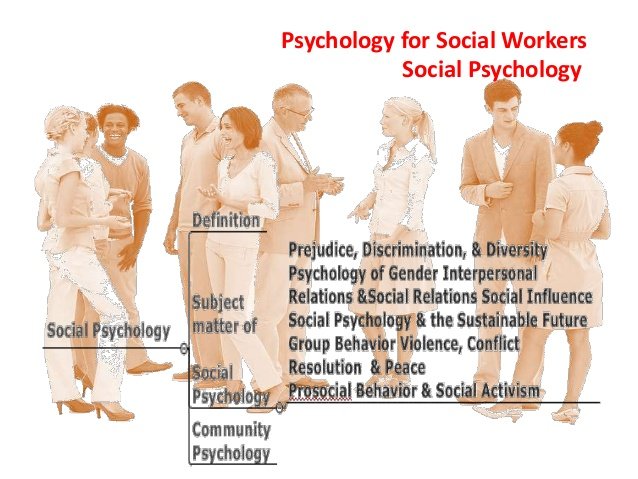The study of human interaction - Social Psychology

Image Source
A broadly utilized and more technical definition to social psychology is the scientific examination of how the feelings, thoughts, and behaviors of people are impacted by the genuine presence of others. It is a science that creates psychological hypotheses to clarify human behavior and tests these speculations experimentally through analyses and perception.
Social psychology's emphasis is on what individuals think, what they feel, and what they do which incorporates physical development, yet additionally what individuals say and how they say it. It is hard to know specifically what individuals are thinking and feeling without construing it from what they say and do. One of social psychology's extraordinary difficulties is to make dependable surmisings about inward states from clear behavior.
What makes social psychology unmistakable from whatever remains of psychology is the last piece of the definition, to do with being impacted by the actual, imagined or implied presence of others.
Actual Presence
Actual presence is simple. You are physically in the presence of other individuals, close by or far away. You can see or hear them, and you may really be interfacing with them.
Imagined Presence
Imagined presence is likewise simple, it is envisioning being in the presence of other individuals, such as suspecting giving a class introduction, playing a football coordinate in an immense stadium, going through a night with your companions.
Implied Presence
Implied presence is more precarious since it alludes to the way that human interaction allots meaning to things. Commonly this social meaning is developed and exchanged through language and tend to think with words, words get from language and communication, and language and communication would not exist without social interaction.

Image Source
A decent case of implied presence is standards. For instance, a large portion of us don't drop litter, notwithstanding when nobody is watching and regardless of whether there is no plausibility of regularly being gotten. This is on account of there are societal standards or traditions that have risen through social interaction that prohibit littering. Such a standard infers the presence of other individuals and decides behavior even without other individuals.
Equipped with this portrayal, we can perceive how social psychology may contrast from neighboring or related orders. We have seen that it is unique in relation to general psychology since it centers around social interaction, amongst people and inside and amongst groups, and on how results of social interaction impact thought and behavior. It contrasts from sociology and anthropology in that it centers around the part of psychological processes that happen inside the leader of the distinctive individual.
Reductionism
Is the act of clarifying a wonder as far as the language and ideas of a lower level of examination.
Society's Level of Explanation:
- Society - groups
- Groups - interpersonal processes
- Interpersonal processes - intrapersonal cognitive mechanisms
- Cognition - neuropsychology
- Neuropsychology - biology

Image Source
An issue of reductionist estimating is that it can leave the first scientific inquiry unanswered. For instance, the demonstration of putting one's arm out of the car window to show an expectation to turn can be clarified as far as muscle compression, or nerve driving forces, or comprehension of and adherence to social traditions. On the off chance that the level of examination does not coordinate the level of the inquiry, at that point the inquiry stays, as a result, unanswered.
Social psychology has been condemned for being inalienably reductionist since it tries to clarify social behavior in wording that are not social, for example, cognitive and motivational processes. Late patterns in social psychology towards social cognitive neuroscience and evolutionary psychology, clarifying behavior regarding neural movement and genetic inclination, can be condemned on similar grounds.
The issue is most intense when social psychologists endeavor to clarify group processes and intergroup relations. By handling these phenomena only as far as personality, interpersonal relations or intra-psychic processes, social psychology may abandon a portion of its most essential phenomena insufficiently clarified.
Acknowledge that diverse levels of clarification exist however to try to build hypotheses that formally incorporate ideas from various levels. One of the more fruitful endeavors is social identity theory, in which both individual cognitive processes and largescale social powers are utilized to clarify intergroup behavior.

Image Source
References:
An Overview of Social Psychology
Social Psychology as a Science of Individual Behavior and Consciousness
Social Interaction
Moscovici and Minority Influence
A Social Psychological Perspective on Mental Health
Social Psycholgy of Intergroup Relations
A Social Identity Theory of Leadership
Nice post as like ever.
Downvoting a post can decrease pending rewards and make it less visible. Common reasons:
Submit